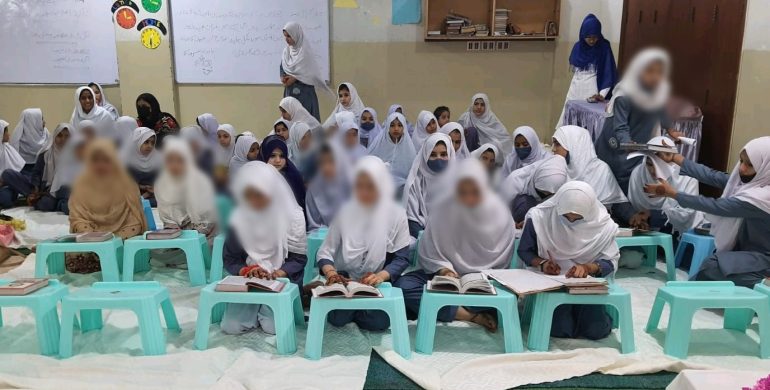At Aisha Islamic Academy (AIA), our mission extends far beyond basic care—we are deeply committed to nurturing the minds and souls of orphan girls through a structured and comprehensive Islamic education. Understanding the vital role religion plays in the life of a Muslim, especially for young girls growing up without parents, we have developed a well-rounded curriculum designed to empower them spiritually, morally, and intellectually.
The religious education at AIA is built upon the foundations of the Quran and Sunnah, combining traditional Islamic teachings with modern educational methodologies to make the content more engaging and practical for today’s generation. We believe that when a girl is grounded in her faith, she not only gains inner strength but also becomes a source of light and guidance in her community.
Nazra-e-Quran (Reading the Quran with Understanding)
Our program begins with Nazra, the correct reading of the Holy Quran. Each student is taught how to recite the Quran accurately, starting from the Arabic alphabet to fluent reading. Special focus is placed on correct pronunciation and fluency, ensuring that each girl is confident in her ability to read the Quran independently.
For many of these orphan girls, it is the first time they are introduced to the Quran in a structured, loving, and peaceful environment. Teachers trained in early Islamic education use gentle methods and personalized attention to help each student master the reading of the Quran.
Tajweed (Rules of Quranic Recitation)
AIA emphasizes not only reading the Quran but reading it correctly—with proper Tajweed. Our Tajweed classes ensure that students learn the correct articulation points (Makharij), rules of elongation (Madd), and stopping symbols (Waqf) that govern Quranic recitation. Tajweed is taught practically through daily recitation and correction sessions, ensuring each student develops a love for reciting the Quran beautifully and correctly.
Many of our students graduate from AIA with the ability to recite the entire Quran with proper Tajweed, a skill that stays with them for life and often inspires them to pursue Hifz or further Islamic studies.
Dars-e-Nizami / Darasat e Deeniya (Structured Islamic Curriculum)
To provide our girls with a deeper understanding of their faith, AIA follows a modified version of the Dars-e-Nizami curriculum, commonly known in our academy as Darasat-e-Deeniya. This includes essential subjects like:
-
Fiqh (Islamic Jurisprudence)
-
Aqaid (Beliefs)
-
Akhlaq (Islamic Morals and Ethics)
-
Seerat-un-Nabi (Life of the Prophet Muhammad ﷺ)
-
Islamic History
-
Arabic Language Basics
This structured religious curriculum is designed to help orphan girls not only understand what Islam teaches, but also why it teaches it. The focus is on building character, spiritual identity, and the ability to make morally sound decisions in life.
Tafseer of the Holy Quran (Explanation and Commentary)
A significant feature of our religious education program is the complete Tafseer of the Holy Quran. Our trained female scholars guide students through a thoughtful exploration of the Quran’s meaning, verse by verse. The Tafseer classes are conducted in easy-to-understand Urdu and are specially designed to relate Quranic teachings to the real-life challenges and questions that young girls face.
This helps the students understand the Quran not just as a holy book to recite, but as a practical guide for every stage of life. By the end of their time at AIA, students have a deep-rooted connection with the Quran, often quoting verses and applying its teachings to everyday matters.
Selected Ahadith with a Focus on Women’s Knowledge
Understanding the teachings of the Prophet Muhammad ﷺ is essential for living a balanced and meaningful Islamic life. At AIA, we include selected Hadith in our curriculum, especially those related to the role, responsibilities, and rights of women in Islam.
Topics include:
-
Islamic manners and etiquettes for women
-
Women in Islamic history
-
Personal hygiene and modesty (Taharah and Haya)
-
Rights and responsibilities within the family
-
Women’s role in society and education
Our goal is to equip these orphan girls with a strong Islamic identity, a sense of purpose, and knowledge that empowers them to become confident Muslimahs who can lead productive lives.
Moral and Spiritual Development
Aside from formal education, the academy promotes an Islamic environment in every aspect of daily life. Girls are encouraged to pray in congregation (Jama’ah), participate in daily Dhikr and Dua sessions, and attend weekly lectures (Bayans) by female scholars.
Special sessions during Ramadan, Hajj, and Islamic months are conducted to instill spiritual values and help students experience the beauty of Islamic rituals and celebrations.


